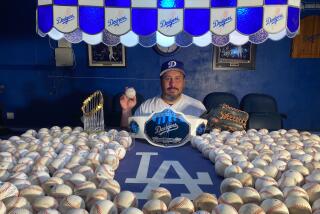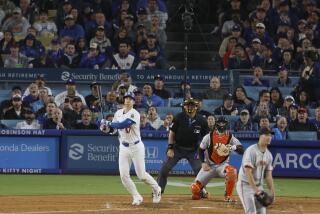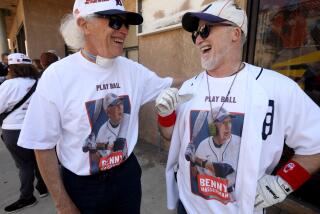Review: ‘Pedro’ goes inside corners of pitcher Martinez’s life
When you get right down to it, baseball is the best blue-collar job you could ever have. Primarily physical, it demands more blisters and brawn than mental gymnastics. That it is now played by millionaires with mega-houses can’t mask that baseball is brutal, often-dangerous work. Sublime? Sure. And occasionally very nasty.
That inherent nastiness is at the core of Pedro Martinez’s new memoir, “Pedro,” written with columnist Michael Silverman. For 18 years, Martinez packed the most dangerous weapon in sports: a 5-ounce hardball. Bolder and bigger than his scrawny frame might suggest, he could purposely snap a 95-mph fastball past a batter’s ear and often did, earning a reputation as one of the game’s finest and most feared pitchers.
Six years after his retirement, Martinez explains how that all came to be, from the hardscrabble childhood in the Dominican Republic to the professional snubs and trades that left him in tears. Almost from the start, Martinez had the arm of Zeus and a boxer’s moxie. At times, his use of a baseball to brush back a hitter, or to plunk a disrespectful opponent, comes off as repellent. But it certainly casts a light on baseball’s dark nature and primitive sense of justice.
Oh, what might have been. To this day, Los Angeles Dodger fans remember Martinez as the legend who got away, traded to Montreal in 1993 for a second basemen who didn’t pan out, then to Boston, where the right-hander did the unthinkable: led the Red Sox to a World Series championship, one of the great conquests in sports history.
Indeed, it was a terrible trade for Dodger fans, yet it turned out to be a career builder for Martinez. He writes of how, in Montreal, he was finally free of a passive-aggressive Dodgers organization that had groomed him since he was a young teen, and out of his brother Ramon’s shadow, then a starting pitcher for the same ballclub.
Martinez blossomed in Montreal, winning the first of his three Cy Young awards, before moving on to Boston, where he would win two more. No longer would he be known primarily as “Ramon’s little brother.” From then on, he would be known as one of baseball’s fiercest pitchers. And also “Senor Plunk.”
Keep in mind, amid all of Martinez’s dings and darts, that his was an uncommonly tough era in which to pitch. Hitters were turbo-charging themselves with steroids, then wrapping themselves with enough elbow and ankle pads to cloak a medieval knight. Once self-shielded, they could lean over home plate like never before, halving the strike zone and further tilting the game in their favor.
“If a pitcher concedes the inner half of the strike zone to the batter, then the pitcher has abandoned half the battlefield,” Martinez writes of his need to pitch inside.
This is the beauty of this book, the machinations of a modern pitcher’s mind. As Martinez explains, pitching is not defense; pitching is offense.
“It made zero difference that I was a skinny kid with a Jheri-curled mullet and a wispy mustache,” he writes in one of the book’s best passages. “With my mind and body – the long, flexible fingers that took so long to unfurl from a baseball to give it that extra rotation and movement ... [to] perfect eyesight that noticed the slightest change in tilt in a batter’s stance or grip on a bat – I could pitch the way I was born to pitch. Without fear.”
There is delicious inside-baseball material here, particularly on his battles with batters, which often devolved into brawls. His clashes with his bosses were equally fierce, including his eventual contract showdown with the stat-obsessed Theo Epstein.
He also gives the inside story on his notorious one-on-one with Don Zimmer, the 72-year-old Yankee coach who ended up face-planted on the field after missing with a punch: “He started to lose his balance. All I did was help him fall faster.”
The pitching sensation “with the heart of a lion” could be an ornery cuss, all right. Martinez explains that very few choirboys make it to the top of any sport. “What matters most is performance,” he writes.
“Anyone who performs can ‘get away’ with their behavior” is a spot-on, though still-troubling, confession from a player heading into baseball’s Hall of Fame this summer.
Boston fans, who know Martinez helped turn around their franchise, will certainly buy this book as a totem to one of the magic moments in baseball history: their 2004 title. So, too, should any true fan of the game. Knowing and gritty, this memoir should’ve been printed on rawhide.
Twitter: @erskinetimes
Pedro
Pedro Martinez and Michael Silverman
Houghton Mifflin Harcourt: 336 pp., $28
More to Read
Sign up for our Book Club newsletter
Get the latest news, events and more from the Los Angeles Times Book Club, and help us get L.A. reading and talking.
You may occasionally receive promotional content from the Los Angeles Times.







